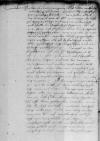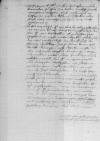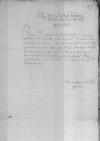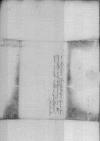Wir haben alless das jennige / so uns E(wer) Er(barkei)t von wegen der lufft zu Marienburg (Malbork), town and castle in northern Poland, Pomeranian Voivodeship, on the Nogat river, a branch of the Vistula at its delta, the capital of the Grand Masters of the Teutonic Order in Prussia (1309-1457), a voivodeship capital in Royal Prussia, which belonged to the Kingdom of Poland (1466-1772). Marienburg (taking turns with Graudenz (Grudziądz)) was the venue for the Provincial Diets of Royal Prussia, which were chaired by the bishop of Ermland (Warmia)⌊MarienburgMarienburg (Malbork), town and castle in northern Poland, Pomeranian Voivodeship, on the Nogat river, a branch of the Vistula at its delta, the capital of the Grand Masters of the Teutonic Order in Prussia (1309-1457), a voivodeship capital in Royal Prussia, which belonged to the Kingdom of Poland (1466-1772). Marienburg (taking turns with Graudenz (Grudziądz)) was the venue for the Provincial Diets of Royal Prussia, which were chaired by the bishop of Ermland (Warmia)⌋ / und umb ein andere zeyt und stelle der Provincial Diet of Royal Prussia ⌊thagfarthProvincial Diet of Royal Prussia ⌋ zu byttenn(n) / Sigismund I Jagiellon (Zygmunt I) (*1467 – †1548), King of Poland and Grand Duke of Lithuania (1506-1548); Duke of Głogów (Glogau) (1499-1506), Duke of Opava (1501-1506), Governor of Silesia (1504-1506); son of King Kazimierz IV Jagiellon and Elisabeth of Austria⌊ko(nigliche)r m(ajeste)tSigismund I Jagiellon (Zygmunt I) (*1467 – †1548), King of Poland and Grand Duke of Lithuania (1506-1548); Duke of Głogów (Glogau) (1499-1506), Duke of Opava (1501-1506), Governor of Silesia (1504-1506); son of King Kazimierz IV Jagiellon and Elisabeth of Austria⌋ u(nserem) a(llergnedigsten) hern mit sondrem vleis durch eygenen bothen cf. Ioannes DANTISCUS to Sigismund I Jagiellon Heilsberg (Lidzbark Warmiński), 1539-04-21, CIDTC IDL 6380, letter lost⌊zugeschrybencf. Ioannes DANTISCUS to Sigismund I Jagiellon Heilsberg (Lidzbark Warmiński), 1539-04-21, CIDTC IDL 6380, letter lost⌋. / Was uns aber zu antwurt worden / werden auss eyngelegter copey versthen. / Es yst dy ferlicheyt unser aller gesuntheyt nicht angesehen und unbedacht vorblybenn etc. Dyweyl es dan so gefharen / ist nue zu rhatslagen ab Sigismund I Jagiellon (Zygmunt I) (*1467 – †1548), King of Poland and Grand Duke of Lithuania (1506-1548); Duke of Głogów (Glogau) (1499-1506), Duke of Opava (1501-1506), Governor of Silesia (1504-1506); son of King Kazimierz IV Jagiellon and Elisabeth of Austria⌊ko(niglich)e m(ajeste)tSigismund I Jagiellon (Zygmunt I) (*1467 – †1548), King of Poland and Grand Duke of Lithuania (1506-1548); Duke of Głogów (Glogau) (1499-1506), Duke of Opava (1501-1506), Governor of Silesia (1504-1506); son of King Kazimierz IV Jagiellon and Elisabeth of Austria⌋ u(nser) a(llergnedigster) her(r) widervmb mit schryfften sey zuersuchen / und mit den vorigen ursachenn umb andere tzeyt und stelle zu bytten / ader aber von uns selbst zeyt und stelle zu setzenn. / Es mussen lewt sein dy unsere sachen am hove wunderlich treyben etc. Ist derwegen unser bedencken / so dy lufft zu Marienburg (Malbork), town and castle in northern Poland, Pomeranian Voivodeship, on the Nogat river, a branch of the Vistula at its delta, the capital of the Grand Masters of the Teutonic Order in Prussia (1309-1457), a voivodeship capital in Royal Prussia, which belonged to the Kingdom of Poland (1466-1772). Marienburg (taking turns with Graudenz (Grudziądz)) was the venue for the Provincial Diets of Royal Prussia, which were chaired by the bishop of Ermland (Warmia)⌊MarienburgMarienburg (Malbork), town and castle in northern Poland, Pomeranian Voivodeship, on the Nogat river, a branch of the Vistula at its delta, the capital of the Grand Masters of the Teutonic Order in Prussia (1309-1457), a voivodeship capital in Royal Prussia, which belonged to the Kingdom of Poland (1466-1772). Marienburg (taking turns with Graudenz (Grudziądz)) was the venue for the Provincial Diets of Royal Prussia, which were chaired by the bishop of Ermland (Warmia)⌋ leydlich wer und sicher / das wir uns noch dohin / ader in eynner bekwemer stelle den XV diss zukunfftigen Iunii begeben etc. Sol uffs newe geschryben werden / wurde sich dy zeyt vorloffen / und sant Michels thag[1] ankomen. / Solle wir auch under uns ane Sigismund I Jagiellon (Zygmunt I) (*1467 – †1548), King of Poland and Grand Duke of Lithuania (1506-1548); Duke of Głogów (Glogau) (1499-1506), Duke of Opava (1501-1506), Governor of Silesia (1504-1506); son of King Kazimierz IV Jagiellon and Elisabeth of Austria⌊ko(niglich)e m(ajeste)tSigismund I Jagiellon (Zygmunt I) (*1467 – †1548), King of Poland and Grand Duke of Lithuania (1506-1548); Duke of Głogów (Glogau) (1499-1506), Duke of Opava (1501-1506), Governor of Silesia (1504-1506); son of King Kazimierz IV Jagiellon and Elisabeth of Austria⌋ wyssenheit und zulass von uns selbst wass setzen (: so der meysteyl unser hendel am hove seltzamer(r) weys gedeut wirt :) mocht uns etwas vorweyslich und zu ungenaden gelangen.  APG 300, 53, 267, p. 44 Was hirynnen E(wer) Er(barkei)t im furderlichsten und bekwemsten zu thun im besten ansehen / wolle wir gerne volgen / auch widerumb ein bothen in unsern kosten zu schicken ader sonst was vonothen zu thun uns nicht besweren etc.
APG 300, 53, 267, p. 44 Was hirynnen E(wer) Er(barkei)t im furderlichsten und bekwemsten zu thun im besten ansehen / wolle wir gerne volgen / auch widerumb ein bothen in unsern kosten zu schicken ader sonst was vonothen zu thun uns nicht besweren etc.
Es hat uns auch Albrecht I von Hohenzollern-Ansbach (Albrecht von Brandenburg) (*1490 – †1568), 1511-1525 Grand Master of the Teutonic Order; from 1525 to his death Duke in Prussia as a liegeman of the Polish king; son of Friedrich V of Brandenburg der Ältere and Sophia Jagiellon (daughter of Casimir IV Jagiellon), nephew of Sigismund I, King of Poland; founder of the university in Königsberg (1544)⌊f(urstliche) D(urchlauch)tAlbrecht I von Hohenzollern-Ansbach (Albrecht von Brandenburg) (*1490 – †1568), 1511-1525 Grand Master of the Teutonic Order; from 1525 to his death Duke in Prussia as a liegeman of the Polish king; son of Friedrich V of Brandenburg der Ältere and Sophia Jagiellon (daughter of Casimir IV Jagiellon), nephew of Sigismund I, King of Poland; founder of the university in Königsberg (1544)⌋ vor sant Stanislai[2] cf. Albrecht I von Hohenzollern-Ansbach to Ioannes DANTISCUS Königsberg, 1539-05-01, CIDTC IDL 6030⌊geschrybencf. Albrecht I von Hohenzollern-Ansbach to Ioannes DANTISCUS Königsberg, 1539-05-01, CIDTC IDL 6030⌋ wy von im Sigismund I Jagiellon (Zygmunt I) (*1467 – †1548), King of Poland and Grand Duke of Lithuania (1506-1548); Duke of Głogów (Glogau) (1499-1506), Duke of Opava (1501-1506), Governor of Silesia (1504-1506); son of King Kazimierz IV Jagiellon and Elisabeth of Austria⌊ko(niglich)e m(ajeste)tSigismund I Jagiellon (Zygmunt I) (*1467 – †1548), King of Poland and Grand Duke of Lithuania (1506-1548); Duke of Głogów (Glogau) (1499-1506), Duke of Opava (1501-1506), Governor of Silesia (1504-1506); son of King Kazimierz IV Jagiellon and Elisabeth of Austria⌋ durch brive gefurdert / das sein D(urchlauch)t yre botschaffter uff gedachter zeyt Provincial Diet of Royal Prussia ⌊thagfhartProvincial Diet of Royal Prussia ⌋ in unser mittel schicken solde / sich das mhal entschuldigt / das sein D(urchlauch)t auch der seynnen dy selbtige zeit zu samen komen het berufft / derwegen nicht schicken mochte. / So aber noch unser Provincial Diet of Royal Prussia ⌊thagfartProvincial Diet of Royal Prussia ⌋ etlichen hern rethen aus unserm mittel / solche handlung wurde befolhen / wolde sein D(urchlauch)t in eygner person / ader durch sein botschaffter / mit solchen angesatzten hern lassen handlen / woruff wir dy zeyt antwurtten / das unser thagfarth sant Stanislai von wegen vorgiffter lufft zu Marienburg (Malbork), town and castle in northern Poland, Pomeranian Voivodeship, on the Nogat river, a branch of the Vistula at its delta, the capital of the Grand Masters of the Teutonic Order in Prussia (1309-1457), a voivodeship capital in Royal Prussia, which belonged to the Kingdom of Poland (1466-1772). Marienburg (taking turns with Graudenz (Grudziądz)) was the venue for the Provincial Diets of Royal Prussia, which were chaired by the bishop of Ermland (Warmia)⌊MarienburgMarienburg (Malbork), town and castle in northern Poland, Pomeranian Voivodeship, on the Nogat river, a branch of the Vistula at its delta, the capital of the Grand Masters of the Teutonic Order in Prussia (1309-1457), a voivodeship capital in Royal Prussia, which belonged to the Kingdom of Poland (1466-1772). Marienburg (taking turns with Graudenz (Grudziądz)) was the venue for the Provincial Diets of Royal Prussia, which were chaired by the bishop of Ermland (Warmia)⌋ nicht mocht gehalten werden / und das wir der halben Sigismund I Jagiellon (Zygmunt I) (*1467 – †1548), King of Poland and Grand Duke of Lithuania (1506-1548); Duke of Głogów (Glogau) (1499-1506), Duke of Opava (1501-1506), Governor of Silesia (1504-1506); son of King Kazimierz IV Jagiellon and Elisabeth of Austria⌊ko(nigliche)r m(ajeste)tSigismund I Jagiellon (Zygmunt I) (*1467 – †1548), King of Poland and Grand Duke of Lithuania (1506-1548); Duke of Głogów (Glogau) (1499-1506), Duke of Opava (1501-1506), Governor of Silesia (1504-1506); son of King Kazimierz IV Jagiellon and Elisabeth of Austria⌋ geschryben etc. Was nue weyther hirynne Albrecht I von Hohenzollern-Ansbach (Albrecht von Brandenburg) (*1490 – †1568), 1511-1525 Grand Master of the Teutonic Order; from 1525 to his death Duke in Prussia as a liegeman of the Polish king; son of Friedrich V of Brandenburg der Ältere and Sophia Jagiellon (daughter of Casimir IV Jagiellon), nephew of Sigismund I, King of Poland; founder of the university in Königsberg (1544)⌊f(urstlicher) D(urchlauch)tAlbrecht I von Hohenzollern-Ansbach (Albrecht von Brandenburg) (*1490 – †1568), 1511-1525 Grand Master of the Teutonic Order; from 1525 to his death Duke in Prussia as a liegeman of the Polish king; son of Friedrich V of Brandenburg der Ältere and Sophia Jagiellon (daughter of Casimir IV Jagiellon), nephew of Sigismund I, King of Poland; founder of the university in Königsberg (1544)⌋ zu antwurtten wer / wolden uns E(wer) Er(barkei)t belernen / dy wir Got dem almechtigen in langweriger gesuntheit und wolfarth thun befelhen. /
 APG 300, 53, 267, p. 44 Was hirynnen E(wer) Er(barkei)t im furderlichsten und bekwemsten zu thun im besten ansehen / wolle wir gerne volgen / auch widerumb ein bothen in unsern kosten zu schicken ader sonst was vonothen zu thun uns nicht besweren etc.
APG 300, 53, 267, p. 44 Was hirynnen E(wer) Er(barkei)t im furderlichsten und bekwemsten zu thun im besten ansehen / wolle wir gerne volgen / auch widerumb ein bothen in unsern kosten zu schicken ader sonst was vonothen zu thun uns nicht besweren etc.



